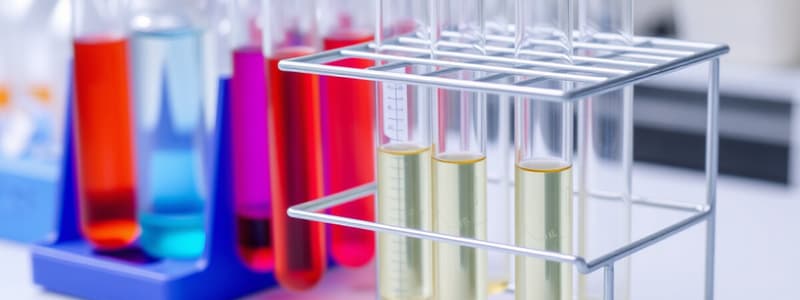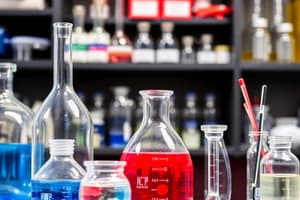Podcast
Questions and Answers
What is the primary function of wire gauze in a laboratory setup?
What is the primary function of wire gauze in a laboratory setup?
- To evaporate solutions rapidly
- To hold multiple test tubes securely
- To support glassware during heating (correct)
- To create a stable framework for heating chemicals
What is the main purpose of a test tube rack?
What is the main purpose of a test tube rack?
- To hold test tubes in place while heating
- To evaporate liquids in test tubes
- To separate components of a mixture
- To allow for the safe storage and transport of test tubes (correct)
Which piece of glassware is used to evaporate solutions?
Which piece of glassware is used to evaporate solutions?
- Desiccator
- Evaporating dish (correct)
- Crucible
- Separatory funnel
What is the function of a test tube holder?
What is the function of a test tube holder?
Which laboratory equipment is used to support a crucible during heating?
Which laboratory equipment is used to support a crucible during heating?
How does a separatory funnel aid in laboratory procedures?
How does a separatory funnel aid in laboratory procedures?
Which piece of equipment is used to preserve moisture-sensitive items?
Which piece of equipment is used to preserve moisture-sensitive items?
Which of the following is true about the use of clay triangles in laboratory settings?
Which of the following is true about the use of clay triangles in laboratory settings?
What is the primary use of a mortar and pestle in a laboratory setting?
What is the primary use of a mortar and pestle in a laboratory setting?
What function does a wash bottle serve in the laboratory?
What function does a wash bottle serve in the laboratory?
Why is it important to avoid heating glassware with a direct flame?
Why is it important to avoid heating glassware with a direct flame?
What role does wire gauze play when used in conjunction with glassware?
What role does wire gauze play when used in conjunction with glassware?
What is the primary use of a volumetric flask?
What is the primary use of a volumetric flask?
Which laboratory equipment is used primarily for culturing cells?
Which laboratory equipment is used primarily for culturing cells?
What is the main feature of an analytical balance?
What is the main feature of an analytical balance?
Which statement about test tubes is correct?
Which statement about test tubes is correct?
What is a Bunsen burner commonly used for?
What is a Bunsen burner commonly used for?
What can a stirring rod NOT be used for in a laboratory setting?
What can a stirring rod NOT be used for in a laboratory setting?
Which of the following is NOT true about a test tube brush?
Which of the following is NOT true about a test tube brush?
Which feature differentiates an Erlenmeyer flask from other flasks?
Which feature differentiates an Erlenmeyer flask from other flasks?
What is a unique characteristic of a Florence flask?
What is a unique characteristic of a Florence flask?
Why are beakers not suitable for precise liquid measurement?
Why are beakers not suitable for precise liquid measurement?
What type of flask is suitable for clamping to a ring stand?
What type of flask is suitable for clamping to a ring stand?
What can be used to cover a beaker to prevent contamination?
What can be used to cover a beaker to prevent contamination?
Flashcards are hidden until you start studying
Study Notes
Laboratory Equipment Overview
-
Wire Gauze: Supports glassware during heating, diffuses heat to prevent direct flame contact, promoting safety.
-
Test Tube Rack: Holds multiple test tubes upright, facilitating simultaneous experimentation and safe storage.
-
Test Tube Holder: Secures hot test tubes for safe handling, essential during heating processes.
-
Evaporating Dish: Laboratory glassware used for evaporating solutions and sometimes melting substances.
-
Clay Triangle: Supports crucibles during high-temperature heating, often used with Bunsen burners.
-
Separatory Funnel: Used for liquid-liquid extractions, separates mixtures into two different density phases.
-
Desiccator: Sealable container with desiccants to protect moisture-sensitive items, keeping chemicals dry and stable.
-
Top Loading Balance: Measures solid materials weighing up to 64.1 kg, accuracy of 0.1 g suitable for general lab use.
-
Analytical Balance: Measures small masses in the sub-milligram range, features a protective enclosure to minimize dust and air currents.
-
Thermometer: Instrument for measuring temperature or temperature gradients in various settings.
-
Tripod: Supports glassware like flasks and beakers during experiments and when not in use.
-
Mortar and Pestle: Used for grinding or crushing substances, important in solid-state chemistry for preparing reactants.
-
Stirring Rod: Tool for mixing chemicals and liquids, essential for laboratory procedures.
-
Wash Bottle: Squeeze bottle with nozzle designed for rinsing laboratory glassware like test tubes.
-
Petri Dish: Shallow cylindrical dish used in biological applications for culturing cells, such as bacteria and molds.
-
Test Tube Brush: Specific cleaning tool for test tubes and similar glassware.
Specific Laboratory Apparatus Usage
-
Volumetric Flask: Designed for precise dilutions and standard solution preparation, calibrated for exact volume at a specific temperature.
-
Bunsen Burner: Produces a single flame for heating, sterilizing, and facilitating chemical reactions in laboratory settings.
-
Test Tubes: Ranges from 3 to 6 inches, primarily used for holding, viewing, or transporting chemicals; many have no measurement markings.
-
Beakers: Versatile containers for mixing and heating, feature spouts for easy pouring but not for precise liquid measurement.
-
Erlenmeyer Flask (Conical Flask): Narrow neck with a wide base for easy mixing and preventing spills; suitable for clamping and heating.
-
Florence Flask (Boiling Flask): Round body with a long neck, designed for uniform heating and effective swirling; may come with a flat bottom for stability.
Studying That Suits You
Use AI to generate personalized quizzes and flashcards to suit your learning preferences.




